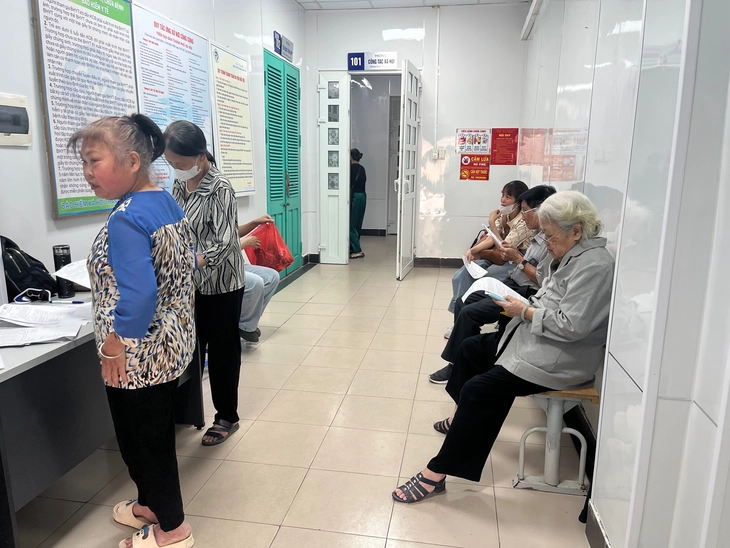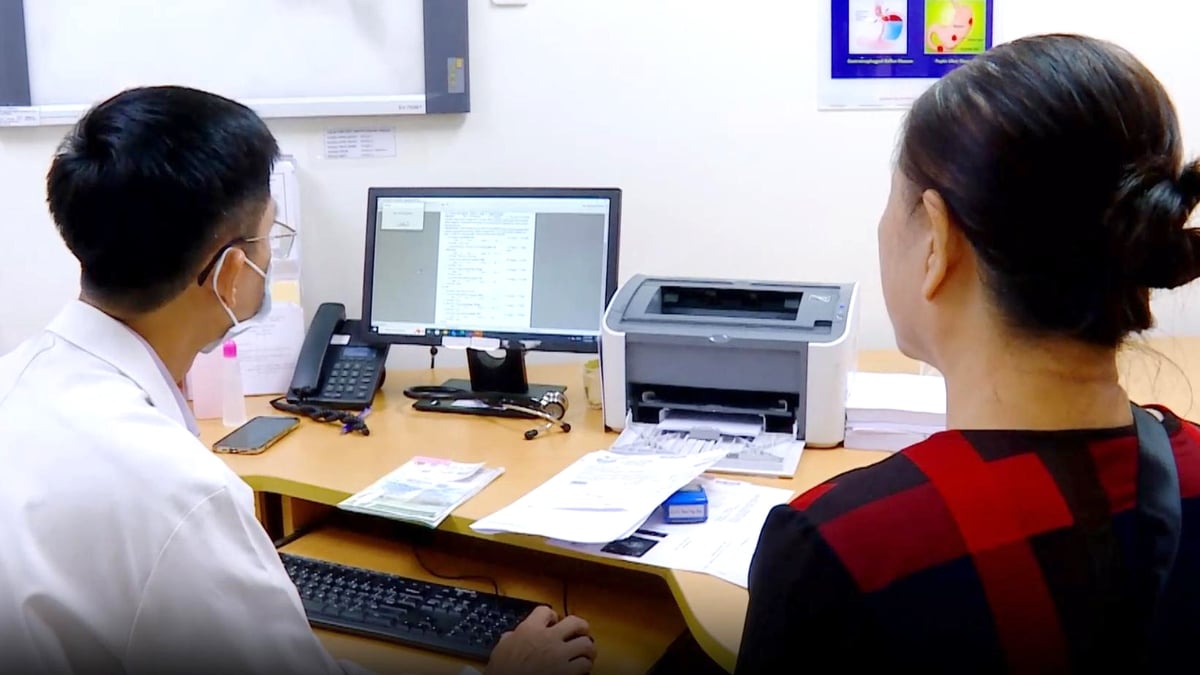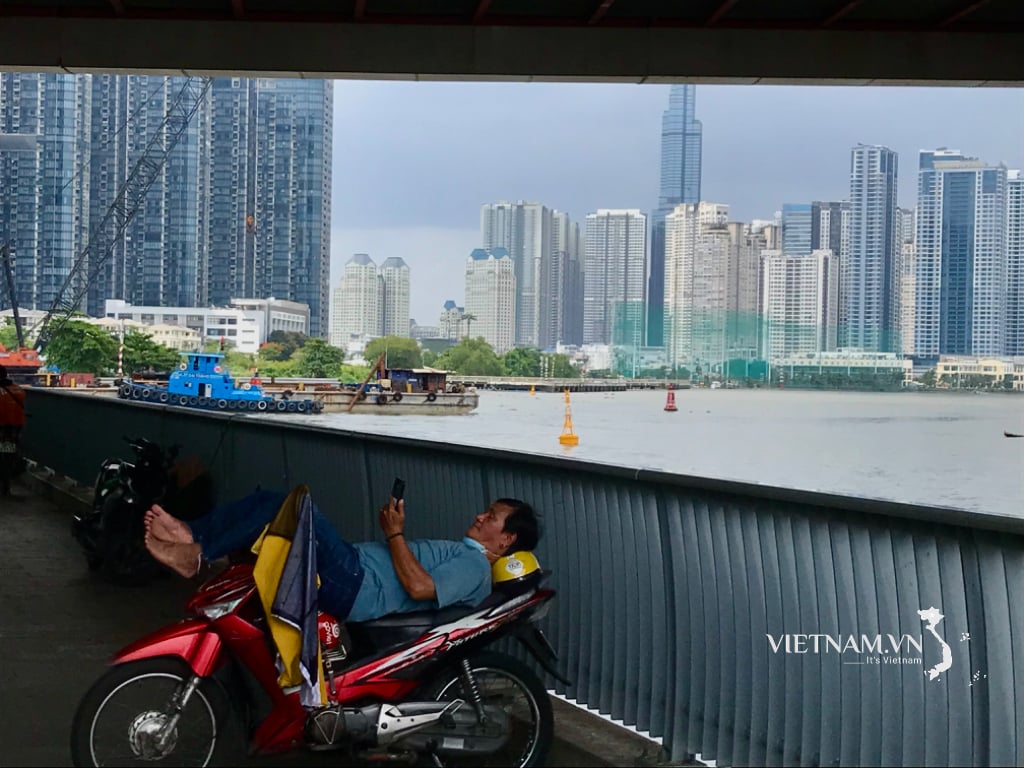
Outpatients receive and monitor medical examination results at Xanh Pon Hospital - Photo: HONG HA
The story of an insurance patient who went to the doctor from 4-5am and had to wait tiredly in Tuoi Tre on May 13 attracted a lot of attention from people, who hoped for a solution to this long-standing situation.
According to Mr. Nguyen Duc Hoa, during the isolation period due to the COVID-19 epidemic, the Ministry of Health and Vietnam Social Security have instructed hospitals to dispense medicine every 2-3 months to patients with chronic diseases (such as diabetes, blood pressure...) who have been treated stably.
"This method will reduce the number of chronic patients coming for check-ups by 50%. If according to the previous schedule, patients had to come for check-ups and get medicine once a month, but in reality, going for check-ups and getting medicine every 2 months still ensures safety and patients don't have to travel, reducing hospital overload," said Mr. Hoa.
In Hanoi , Xanh Pon Hospital has been applying medicine dispensing every 2 months for chronic patients since November 2024.
Previously, according to Ms. Tran Lien Huong - Deputy Director of the hospital, in the period of 2020-2023, Xanh Pon provided medicine for a maximum of 3 months/time for outpatients in the context of the COVID-19 epidemic. Currently, the hospital has a policy of providing medicine for 2 months/time for people with chronic diseases such as diabetes, blood pressure, lipid metabolism disorders, osteoarthritis, rheumatoid arthritis, chronic viral hepatitis B, allergic vasculitis, Parkinson's...
There are a total of 2,300 patients currently being examined and receiving medicine in this form at Xanh Pon and this number is increasing over time.
Mr. Luong Duc Dung, head of the general planning department, Xanh Pon Hospital, said that the rate of patients receiving medication every 2 months who have to return for a check-up within 50 days (nearly 2 months) accounts for 3% of this group, the main reasons being the appearance of side effects, unwanted reactions, need to adjust the dose or change medication, the emergence of unusual symptoms...
97% of the 2,300 patients who were given longer-term medication were treated safely and did not need to return for a check-up before coming for a new check-up. Mr. Dung said that this helped save travel time and waiting time, especially for elderly patients and those who lived far from the hospital.
For hospitals, Mr. Dung said that this policy also contributes to significantly reducing the frequency of patients coming to the hospital, especially during the busy hours of 8-10am and 1-3pm, thereby making it more convenient for professional work in the examination departments.
Xanh Pon Hospital currently has 230,000 people with health insurance cards registered for initial medical examination and treatment. If the number of chronic patients registering to receive medicine every 2 months increases, the reduction effect could be even higher.
According to Mr. Nguyen Duc Hoa, for the past 2 years, Vietnam Social Security has proposed many times the method like Xanh Pon and the Ministry of Health also agreed, but very few hospitals have applied it after COVID-19.
"In addition to extending the time to provide medicine for chronic patients, it is necessary to improve the quality of lower-level medical facilities. If lower-level medical facilities provide quality medical examination and treatment, with good service attitude, patients will not have to wait at higher-level facilities anymore. Or the health sector will have a policy of rotating doctors to lower-level medical examination and treatment as before, then the workload can be reduced," Mr. Hoa suggested.
Source: https://tuoitre.vn/phat-thuoc-2-thang-lan-de-giam-tai-benh-vien-va-giam-thoi-gian-cho-kham-bao-hiem-20250514090143109.htm























































![[Maritime News] Container shipping faces overcapacity that will last until 2028](https://vphoto.vietnam.vn/thumb/402x226/vietnam/resource/IMAGE/2025/7/30/6d35cbc6b0f643fd97f8aa2e9bc87aea)













































Comment (0)